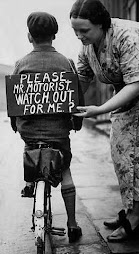 Bicycles and pedestrians filled Lafayette Street at Canal Street on Saturday, the first day of the Summer Streets program.
Bicycles and pedestrians filled Lafayette Street at Canal Street on Saturday, the first day of the Summer Streets program.By JAVIER C. HERNANDEZ
At Grand Central Terminal, the trains ran as usual on Saturday. Tourists studied maps, vendors hawked water and magazines — but outside, something was off. On one side of the station there were no cars, taxis or delivery trucks. Instead, the street was filled with pedestrians and bicycles.
Jason Phelps, 34, stepped off the curb, tilted his sunglasses and froze. “I’ve just walked into a swarm of bicyclists,” he told someone on his cellphone. “I don’t know what they want,” he joked, “but I’m going to close my eyes and pray.”
The ding of bicycle bells and the chatter of people on foot replaced the usual automobile noises along 6.9 miles of Manhattan for six hours on Saturday. It was the first day of Summer Streets, the city’s experiment in car-free recreation modeled on similar efforts in Guadalajara, Mexico; Bogotá, Colombia; Paris; and several American cities.
On a path that extended from the Brooklyn Bridge north to Park Avenue and the Upper East Side, thousands of people filled the streets, taking part in activities like street-side tai chi or salsa dancing. Others simply enjoyed the chance to stroll in normally car-clogged streets. In a city where walkers, cyclists and motorists must share limited space, having a major thoroughfare through Manhattan free of cars created a giddy sort of excitement.
Deborah Fried, 48, a tourist from California, rented a bicycle outside the Loews Regency Hotel on Park Avenue. Ms. Fried said she regularly rode her bicycle at the beach near her hometown of Pacific Palisades, but she had never bicycled on her visits to Manhattan .
She said the Summer Streets path felt safe.
“You don’t have to worry and be killed by a taxi,” she said. “To me, this beats bicycling on the beach because you get the flavor of the city.”
The route was broken up by three rest stops, where water, maps and first aid were available. The stops also featured music and dance performances, and yoga and other exercise classes. Police officers directed traffic at 24 streets crossing the route.
Rabbi Jonathan Feldman, 47, took advantage of the break in traffic for a walk with his children before morning services. He said he appreciated the early morning quiet on Park Avenue.
“It gives the city a certain calmness that it doesn’t have otherwise,” Rabbi Feldman said.
The city may make Summer Streets, which continues the next two Saturdays from 7 a.m. to 1 p.m., a regular event if it proves to be a success (city officials have said that this would be a subjective measure).
Although Department of Transportation officials said they did not yet have an estimate of how many people turned out on Saturday, Janette Sadik-Khan, the transportation commissioner, praised the debut. “Summer Streets really struck a chord this morning,” she said in a statement.
The plan to close off streets had drawn criticism from shop owners, who feared it would hurt business. But the city assured skeptics that Summer Streets might bring more customers to their stores.
On Saturday, the economic impact remained unclear. Martha Barzola, 37, manager of a Papyrus stationery store on Park Avenue, said that the area around the store during summer weekends can sometimes resemble a ghost town. Because of the increased foot traffic, however, her store achieved its sales goal of $600 for the day within two hours, she said.
But Ibrahim Hamzah, an assistant manager for an Edison ParkFast lot on the corner of Lafayette and Great Jones Streets, said he had not had a single customer, in contrast to the 30 or 40 cars that is typical for a Saturday in summer.
“The number of times this is going to happen should be minimal,” Mr. Hamzah said. “We’re losing money, and it makes the job boring.”
There were other complaints. One woman, who declined to give her name because she was in a rush, said she had to park several blocks away to get to a medical appointment. Other pedestrians said that some novice riders, still learning to control their bicycles, were a danger to those on foot. Delivery of food to restaurants was disrupted because trucks could not get in.
Taxi drivers had also worried that Summer Streets would reduce the number of people hailing cabs. But Ali Sada, parking his cab for a few minutes at Park Avenue and 57th Street, praised the event.
“All these people are going to be tired when they put their bikes away,” he said. “We’re going to make a lot more money.”
Jason Grant contributed reporting.










No comments:
Post a Comment